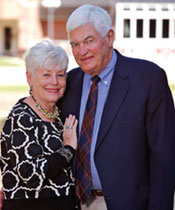Outright Gift of Life Insurance
Powerful and Simple Way to Support Our Work
When the original purpose for a life insurance policy no longer applies—such as educating children now grown or providing financial security for a spouse—your policy can become a powerful and simple way to support our work. There are three ways to give life insurance to Central College:
Name us a beneficiary of the policy. This gift is as simple as updating your beneficiary designation form with the policy holder. You can designate us as the primary beneficiary for a percentage or specific amount. You can also make us the contingent beneficiary so that we will receive the balance of your policy only if your primary beneficiary doesn't survive you.
Make an outright gift of an existing policy. You can name us as owner and beneficiary of an existing policy. You qualify for a federal income tax charitable deduction when you itemize on your taxes. If you continue to pay premiums on the policy, each payment is tax deductible as a charitable gift when you itemize.
Make an outright gift of a new policy. You can take out a new policy and irrevocably name Central as the owner and the beneficiary of the insurance contract. This method may be particularly attractive for the younger donor. Whether you make one single premium payment for the policy or pay annual premiums, each payment is tax deductible as a charitable gift when you itemize on your taxes.
How You Can Benefit From Giving Life Insurance
Learn more about this simple gift by downloading your FREE copy of our informative guide Change Lives With Life Insurance.
View My GuideSee How It Works
A Sense of Community
 For Jim and Kathy Vande Berg, both graduates of the class of 1960, Central College is all about relationships—with faculty, with family members, with classmates at reunions. But the most important relationship they developed at Central was with each other. "Central was where we met, fell in love and made a lifelong commitment to one another," Jim says.
For Jim and Kathy Vande Berg, both graduates of the class of 1960, Central College is all about relationships—with faculty, with family members, with classmates at reunions. But the most important relationship they developed at Central was with each other. "Central was where we met, fell in love and made a lifelong commitment to one another," Jim says.
Now Jim and Kathy are making a commitment to Central-an investment in its future. They look back fondly on their days here 50 years ago. "Central was a laboratory in a small setting providing opportunities to question, explore, succeed and fail (always within the context of a safety net) in many different areas," Kathy says.
But the couple is also excited about what Central has become since they graduated, and about the new avenues of education being explored at the college. As alumni, the Vande Bergs are proud of the great strides Central has made, especially in the past decade. That's why they decided to purchase a life insurance policy, naming Central as owner and beneficiary-because ultimately it will provide a significant gift for Central's future which they believe is rich and bright.
The Vande Bergs are grateful for the education and relationships the Central community has given them. By giving back, the couple is ensuring that more of those connections will be made, that the Central community will grow and thrive as it always has.
Not Sure How to Begin Planning?
Create a secure plan for you and your loved ones with our FREE Personal Estate Planning Kit.
Download My KitGifts That Pay
Your payments depend on your age at the time of the donation. If you are younger than 60, we recommend that you learn more about your options and download this FREE guide Plan for Retirement With a Deferred Gift Annuity.
Information contained herein was accurate at the time of posting. The information on this website is not intended as legal or tax advice. For such advice, please consult an attorney or tax advisor. Figures cited in any examples are for illustrative purposes only. References to tax rates include federal taxes only and are subject to change. State law may further impact your individual results. California residents: Annuities are subject to regulation by the State of California. Payments under such agreements, however, are not protected or otherwise guaranteed by any government agency or the California Life and Health Insurance Guarantee Association. Oklahoma residents: A charitable gift annuity is not regulated by the Oklahoma Insurance Department and is not protected by a guaranty association affiliated with the Oklahoma Insurance Department. South Dakota residents: Charitable gift annuities are not regulated by and are not under the jurisdiction of the South Dakota Division of Insurance.